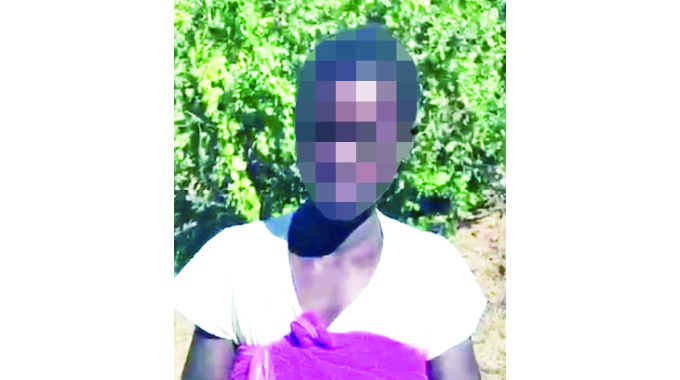Garikai Fadzi
Correspondent
Mbire in Mashonaland Central is a community of the VaDoma people, who are yet to fully adopt and adapt to education and the art of farming for survival.
Yirira Communal Lands in Hangwa (Angwa) under Chief Chisunga, near Zimbabwe’s border with Zambia, is a place where the geography that flung it to almost anonymity came with the extra condemnation of nature.
Here, the vagaries of nature, chiefly drought, unbearable heat and the attendant sicknesses such as malaria, present a continuing menace that the people of this area contend with every day.
Yet, even if one becomes hardened to these elements, not so many would resist the hunger that gnaws the belly, often forcing the girl child into teenage marriage. What with no lobola being paid during marriage rites?
Most of the community members, can neither write nor read and they are battling with the transition from being part of the larger nomadic Doma mountain people to permanent settlers, as per the dictates of modern life.
Most of the children here, especially the girls, have not seen the door of a classroom. All they know is bush life — hunting, fishing and gathering.
They have never tilled the land, but they know every tree by its name, they know every animal by its name and indeed they know every hillock, hill, mountain, stream, river and pool in the area.
In neighbouring Chewore National Park, the place from which they used to hunt for meat and gather food — mainly honey and fruits, National Parks rangers have declared them poachers and sealed off the area.
It is now a no-go area and they are typically between a rock and hard surface.
Gnawed by hunger, their bellies rumble in protest, day in and day out. Each day that comes and passes is a struggle for survival and not for living, since there, living becomes a luxury, but survival is a must.
There is a worrying rise in teen marriages in Hangwa.
The Doma women say they see marriage as an escape route out of poverty.
Most of these women are undocumented and do not know how to read and write.
A majority of them hardly have any education as their families believe only the boy child should be educated.
But even after getting married early, poverty still follows them.
“Since morning we just ate porridge from wild fruits. The baby did not eat anything, she just suckled my breast. I need food for the baby, soap and clothing. My baby doesn’t have these things. That’s the assistance I need,” said one of the young mothers.
It’s a plight she shares with many of her ilk, who got into marriage before they turned 18 and after dropping out of school.
The few that have tried to pursue education have not found the quest easy. Their poverty stood out like a sore thumb, often inviting scorn from their peers.
Another woman said: “When children went to school parents were supposed to buy them books and clothes. Children would just wear bits and pieces. In the past there were no clothes. If a father got a pair of trousers, he would cut it up and find something for the child to wear.
“So, when we went to school those with proper clothes would laugh at us and say ‘See the VaDoma, See the VaDoma, walking around without clothes.’ And for sure we did not have much to wear.”
Such scorn pushed many out of school to pursue other endeavours. And with little options available, marriage was the only resort.
A women’s rights organisation Katswe Sisterhood, working with the National Aids Council, has introduced a number of projects including goat rearing to empower these young mothers.
Besides empowering the girls, NAC and these organisations seek to end early marriages, early and unintended marriages and HIV.
Implementation of the SASA Methodology is supported under the Spotlight Initiative Supported programme.
Mozambique, Niger, Nigeria, Uganda and Zimbabwe are some of the African countries which have adopted the model, launched in September 2017 by the United Nations.
Some of them are now sending their children to school, a right which they could not enjoy.
Katswe Sisterhood projects officer, Fadziso Maunganidze said: “As part of reducing Gender Based Violence in this Ward, we started a goat rearing project as also part of resilience building, with about 56 young women.”
Primitive exercises which are harmful to girls such as early marriages were common until recently when authorities moved in to restore order.
Presently, both the girl and boy child are being treated equally.
Although it is not yet enough, remnants of such dangerous practices are still visible, but efforts to stop them must be commended.
What has fuelled these inequalities all along is that the province is a hub of illegal mining activities which authorities say are fuelling lawlessness and uncouth behaviour.
Mashonaland Central NAC provincial manager Edgar Muzulu says many initiatives have been undertaken to reduce the spread of STIs and HIV, adding that results are slowly becoming visible.
According to latest statistics, the province has an 81 percent knowledge of HIV among adults while knowledge levels among youths are at 38,8 percent.
“We have under age children as young as 12 years falling victim. Even on issues of pregnancy, closer analysis of P5 forms presents evidence suggestive of children being raped, forced into early marriage or even prostitution,” he said.

COMMENTS